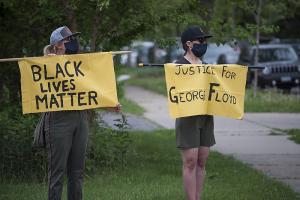
Christians must reject all forms of racism, for, as St. John Paul II declared, “Racism is a sin that constitutes a serious offence against God.” [1] Everyone is made in the image and likeness of God. Undermining the dignity of a person is an affront against God because it is an attack against a representation of God himself. [2] As blasphemy is found in all acts of irreverence against God, racism must be recognized for what it is: blasphemy.
Racism can come in many forms., with systematic racism, where the structure which underlies society serves to keep some racial groups in power so they can subjugate others, being one of the worst. Because the state should serve the common good, and not the particular interests of specific racial groups, where systematic racism is found, we find the state has been compromised. And, as Pope Francis stated, this happens all too frequently in the world:
It is a common doctrine that the State is at the service of the person and of natural groupings of people such as the family, the cultural group, the nation as an expression of the will and customs inherent in a people, the common good and peace. Too often, however, States are subjugated to the interests of a dominant group, largely for motives of economic profit, which oppress, among others, ethnic, linguistic or religious minorities who are in their territory.[3]
Since racism destroys the justice necessary for the state to follow its mission, even as racism is demonstrably a form of blasphemy, it is imperative for Christians to fight against it wherever it is found. And as we see racist nationalists rising in power, not only in the world, but within Christian circles, Pope Benedict XVI’s words are apropos:
How important it is, especially in our time, that every Christian community increasingly deepens its awareness of this in order also to help civil society overcome every possible temptation to give into racism, intolerance and exclusion and to make decisions that respect the dignity of every human being![4]
Systematic racism can be seen in the way African Americans, Native Americans, and others people, are not treated equally by law enforcement officers. What happened to George Floyd, a 46-year-old African American who had his life unjustly taken away from him by a police officer, is not only terrible tragedy in and of itself, it is also the representation of a common problem in the United States. African Americans are easily targeted and killed, both by law enforcement officers, and by private citizens. Their rights are not respected. Police are far more likely to use excessive force when apprehending African Americans, leading to tragedies like George Floyd or Sean Reed, than they are by people of many other ethnicities. Americans, moreover, have become accustomed, to it, thinking that police must be in the right, unless they are shown the tragedy for themselves by way of video.
It’s bad that African Americans have to fear what happens when they are stopped by police. It’s worse to see that when they protest such abuse, their protests are marginalized and treated differently from protests dealing with other concerns. All we need to do to see this is compare how protests against what happened to George Floyd were treated compared to those protests based upon lockdowns due to the COVID19 pandemic. Those protesting what happened to Floyd were attacked by law enforcement officials with tear gas and rubber bullets. On the other hand, those protesting various statewide quarantines took up arms, threatened politicians and stormed governmental buildings, without law enforcement officials doing anything to stop them.
What happened to George Floyd (and countless other African Americans throughout the years) represents systematic injustice, while the lockdowns due to the pandemic represent the state acting as it should for the common good. Why do we find such a difference in the way each of the different groups of protesters were treated? Because it has been long established in our society that African Americans can be abused in this way, with their dignity and rights taken away, while those who have been fighting against just rules and regulations based upon the pandemic are those who have already been accorded a form of privilege if not supremacy in our society. This is what systematic racism does. This is what supremacy does. This represents one of the fundamental sins which lie at the heart of our society, a sin which has not yet been excised but instead, has been fermenting and growing stronger for several years and now feels capable of showing itself for what it is.
Police have been told they can abuse African Americans with minimal or no consequences for their actions. Thus, just recently, we see a cop punched an African woman. Another African American woman, walking her dog without a leash, was roughly treated by police in San Diego. On the other hand, when a Caucasian woman, walking her dog without a leash, calls the police, hoping to lock up the African American man who told her to put her dog on a leash, she has nothing to fear from the police, for she knows she will not be arrested or roughed up for her actions. We have already seen what happens when the roles are reversed. This shows us how society, by the way it is policed, undermines the dignity of African Americans.
Is there any surprise why African Americans (and many others) feel less than supportive of the society which treats them in such a fashion? Is there any surprise that they will protest how they are treated? Is there any surprise, if they are mistreated by law enforcement officials during their protests, they become violent? Certainly, violence is not the answer, but it is understandable why it happens. When society says it is fine to treat African Americans with cruelty, to violently attack them and undermine their human dignity, are they not being taught that violence is justifiable and is the way to get what one wants? So long as systematic structures of racism remain enforced in society by law enforcement officials, as long as various peoples find their dignity undermined by systematic racism, we should expect (with sorrow) the outbreak of such violence. If we do not like it (which we should not), then we should not like the violence which lies behind it, the violence which has been enforced by systematic racism. If we don’t want violence and destruction, we must put a stop to its causes.
We can and must do better. Systematic racism must not only be dismantled, but reparations must be made to those who have suffered at its hands. Not only is it a basic moral teaching of the Christian faith that we must make restitution for what we have done wrong, it is also the only way a just society can emerge, one which truly takes into consideration the common good. And, as John Paul II explained, Christians must have a role in developing this just society:
To oppose racism we must practice the culture of reciprocal acceptance, recognizing in every man and woman a brother or sister with whom we walk in solidarity and peace. There is need for a vast work of education to the values that exalt the dignity of the human person and safeguard his fundamental rights. The Church intends to continue her efforts in this area, and asks all believers to make their own responsible contribution of conversion of heart, sensitization and formation. [5]
Christians must not only speak of social justice, but they must act on it. They must take what they have learned of justice from God and work to make for a just society. And in doing so, they will be honoring God, for just as racism represents a blasphemous attack on God, so acting justly towards others, honoring the dignity of each human person, we end up honoring God whose image and likeness is found in them.
[1] St John Paul II, “Angelus” (8-26-2001). Vatican Translation. ¶2.
[2] When Jesus said what is done to the least among us, is done to him, is that not another way of saying the same thing?
[3] Pope Francis, “To the Participants In the Plenary Session of the Pontifical Academy of Social Sciences.” (5-2-2019). Vatican translation.
[4] Pope Benedict XVI, “Angelus” (8-17-2008). Vatican translation.
[5] St John Paul II, “Angelus” (8-26-2001), ¶3
Stay in touch! Like A Little Bit of Nothing on Facebook.
If you liked what you read, please consider sharing it with your friends and family!













